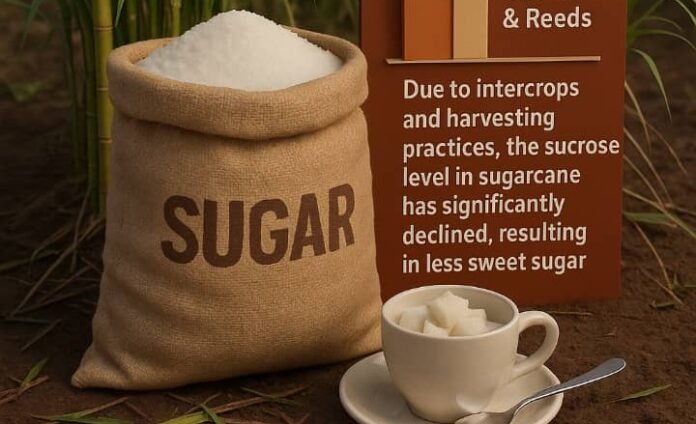By: Isaac Christopher Lubogo
Introduction: The Paradox of Sweetness
Sugar, by its very essence, is meant to embody sweetness. Yet in Uganda today, particularly in regions like Mayuge, the consumer is forced to heap spoon after spoon into a cup of tea, only to realize that the expected sweetness has been diluted. This is not a mere matter of perception. It is a structural crisis born from questionable cropping and harvesting practices that undermine both consumer trust and national food security.
The Anatomy of Contamination
The heart of the problem lies in the desperate economic practices of sugarcane growers. To maximize weight — and hence revenue from sugar factories — farmers increasingly intercrop sugarcane with napier grass (elephant grass) and reeds. When these are harvested together, the millers’ machines are unable to differentiate between cane and grass. Everything is ground into the same crushing rollers.
The result is not just a heavier tonnage delivered, but a product whose sucrose concentration is markedly diluted. What should have been a crystal of pure sweetness becomes a dull, lifeless grain of adulterated sugar.
Historical and Agricultural Context
Uganda’s sugar industry has long been a backbone of the rural economy, particularly in Busoga (Mayuge, Jinja, Kamuli). However, pressure from declining yields, land fragmentation, and market competition has encouraged short-term profit-maximization. Farmers, pressed by poverty and debt, are incentivized to “cheat” the system, knowing that millers do not have precise sorting technologies.
The irony is tragic: in trying to survive economically, farmers compromise the very product that sustains their livelihood.
Consequences for Consumers and Industry
1. For Consumers: The diluted sugar not only tastes weak but also undermines consumer confidence. Families now spend more for less sweetness, further straining household budgets already battered by inflation.
2. For Industry: Factories that continue to accept such mixed harvests damage their brand reputation, making Uganda’s sugar less competitive in regional and global markets. Moreover, the machines wear out faster when grinding fibrous reeds not meant for processing, raising maintenance costs.
3. For Health: Increased consumption of larger quantities of sugar — just to achieve the expected taste — raises risks of diabetes, obesity, and related metabolic disorders.
The Ethical Question
At its core, this is not only an agricultural problem but a moral one. The deliberate adulteration of sugarcane harvests represents a quiet betrayal — of the farmer to the factory, and of the industry to the consumer. It raises pressing questions about integrity, regulation, and governance within Uganda’s agro-industrial framework.
Policy and Regulatory Gaps
Uganda’s Sugar Act of 2020 was intended to stabilize the industry by regulating outgrowers, zoning, and factory operations. Yet it did not sufficiently address the microscopic issue of harvest quality. The lack of rigorous inspection mechanisms, laboratory testing at factory gates, and farmer education has allowed these practices to spread unchecked.
A Way Forward
1. Technological Interventions: Factories must invest in sorting and sucrose-testing technologies to detect adulteration before milling.
2. Farmer Education: Sensitization campaigns should emphasize long-term benefits of quality over short-term cheating.
3. Incentive Realignment: Introduce premium pricing for higher sucrose-yield cane, rewarding honesty and quality.
4. Regulatory Enforcement: The Ministry of Trade and the Uganda National Bureau of Standards (UNBS) must establish strict penalties for compromised cane deliveries.
5. Consumer Advocacy: Civil society and media should amplify consumer voices to hold both farmers and millers accountable.
Conclusion: The Philosophy of Sweetness
What is sugar without sweetness? In many ways, it is a metaphor for our national condition: when shortcuts, greed, and lack of oversight dilute our collective harvest, the end product of development is tasteless. Uganda must rediscover the integrity of its agricultural backbone, ensuring that what the farmer grows, what the factory mills, and what the consumer buys remain aligned in purity and purpose.
As the African proverb reminds us: “A lie has speed, but truth has endurance.” Short-term tricks with napier grass may give temporary weight, but only honesty in agriculture can secure enduring sweetness for Uganda’s future.








